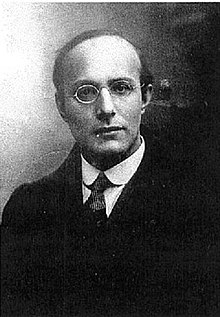
Back كارل بولاني Arabic كارل بولانى ARZ Karl Polani AZ Карл Полани Bulgarian Karl Polanyi Catalan Károly Polányi CO Karl Polanyi Czech Karl Polanyi Danish Karl Polanyi German Καρλ Πολάνυι Greek
Karl Polanyi | |
|---|---|
 Polanyi, c. 1918 | |
| Born | 25 October 1886 |
| Died | 23 April 1964 (aged 77) Pickering, Ontario, Canada |
| Spouse | |
| Children | Kari Polanyi Levitt |
| Relatives |
|
| Academic career | |
| Field | Economic sociology, economic history, economic anthropology, Philosophy |
| School or tradition | Historical school of economics |
| Influences | Robert Owen, Bronisław Malinowski, G. D. H. Cole, Richard Tawney, Richard Thurnwald, Karl Marx, Aristotle, Karl Bücher, Ferdinand Tönnies, Adam Smith, Alfred Radcliffe-Brown, Werner Sombart, Max Weber, György Lukács, Carl Menger |
| Contributions | Embeddedness, Double Movement, fictitious commodities, economistic fallacy, the formalist–substantivist debate (substantivism) |
| Part of a series on |
| Economic, applied, and development anthropology |
|---|
| Social and cultural anthropology |
Karl Paul Polanyi (/poʊˈlænji/; Hungarian: Polányi Károly [ˈpolaːɲi ˈkaːroj]; 25 October 1886 – 23 April 1964)[1] was an Austro-Hungarian economic anthropologist, economic sociologist, and politician,[2] best known for his book The Great Transformation, which questions the conceptual validity of self-regulating markets.[3]
In his writings, Polanyi advances the concept of the Double Movement, which refers to the dialectical process of marketization and push for social protection against that marketization. He argues that market-based societies in modern Europe were not inevitable but historically contingent. Polanyi is remembered best as the originator of substantivism, a cultural version of economics, which emphasizes the way economies are embedded in society and culture. This opinion is counter to mainstream economics but is popular in anthropology, economic history, economic sociology and political science.
Polanyi's approach to the ancient economies has been applied to a variety of cases, such as Pre-Columbian America and ancient Mesopotamia, although its utility to the study of ancient societies in general has been questioned.[4] Polanyi's The Great Transformation became a model for historical sociology. His theories eventually became the foundation for the economic democracy movement.
Polanyi was active in politics, and helped found the National Citizens' Radical Party in 1914, serving as its secretary. He fled Hungary for Vienna in 1919 when the right-wing authoritarian regime of Admiral Horthy seized power. He fled Vienna for London in 1933 when Adolf Hitler came to power in Germany and fascism was on the ascendancy in Austria. After years of unsuccessfully seeking employment at universities in the United Kingdom, he moved to the United States in 1940 where he joined the faculty at Bennington College and later taught at Columbia University.
- ^ Encyclopædia Britannica (Chicago: Encyclopædia Britannica Inc. 2003) vol 9. p. 554
- ^ "Karl Polanyi | Hungarian politician | Britannica". www.britannica.com. Retrieved 3 August 2022.
- ^ "Karl Polanyi". Oxford Reference. Retrieved 26 July 2021.
- ^ Silver 2007.